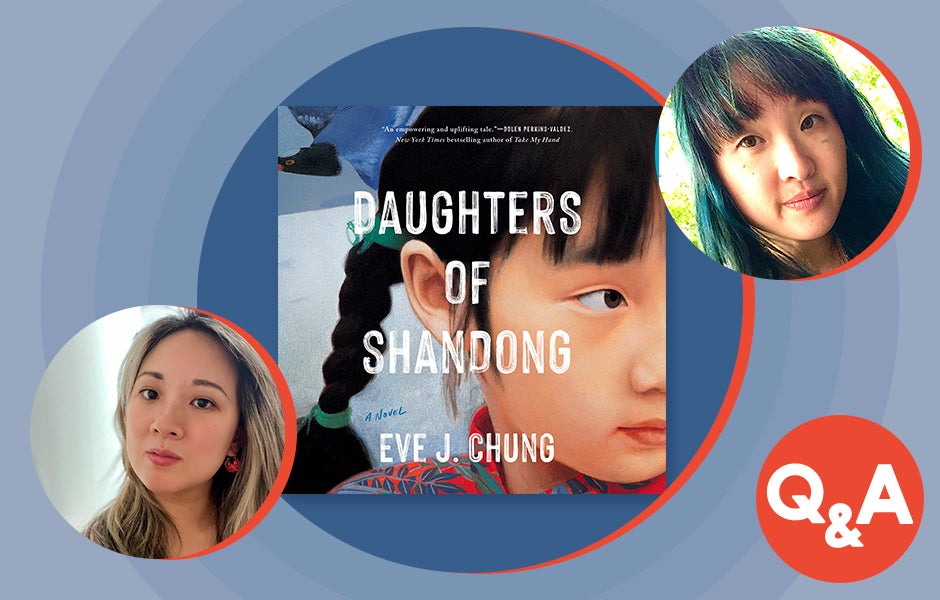
Daughters of Shandong, the new novel from human rights lawyer and author Eve J. Chung, is a sweeping tale about the resilience of women in war, the enduring love between mothers, daughters, and sisters, and the sacrifices made to lift up future generations. It also happens to be based on Eve’s own true family history: the tribulations that the Ang family face draw significantly from the journey Eve’s grandmother had to make for survival.
We sat down with Eve and Yu-Li Alice Shen, the narrator of the Daughters of Shandong audiobook, for a conversation about process, where history and fiction meet, and their surprising overlapping family stories.
Penguin Random House Audio: Hi Eve and Yu-Li! We’re so happy to talk with you both. Before we dive in to audio goodness, Eve, could you tell our readers a bit about Daughters of Shandong?
Eve J. Chung: Daughters of Shandong is about a woman and her three girls who were left behind by their family at the turning point of the Communist Revolution, because daughters were considered worthless. While the rest of the family fled to Taiwan, the four of them had to face the incoming hordes and stand trial in the family’s place. With almost nothing but their wits, they had to journey to safety, and confront the people who abandoned them.
PRHA: It’s such a powerful story. And so close to home–what inspired you to share your family’s story?
Eve: I was inspired by my children. This story was written for them, because my grandmother passed away before they were born so they never got to know her. I wanted my children to understand where they came from, and what an amazing journey my grandmother went through to survive.
PRHA: Yu-Li, how did it feel to work on a project so personal to someone else?
Yu-Li Alice Shen: I felt immediately connected to Eve’s book because I knew that despite it being labeled fiction, it drew very much from real-life historical events that still impact Chinese, Taiwanese, and Asian-American lives today. My mother and I were both born in Taiwan, and I remember talking about the tail end of foot-binding, the Chinese diaspora of the 1940s-50s, and the ongoing reunification battle, quite a bit throughout my life.
I did feel a tremendous sense of responsibility in delivering Eve’s grandmother’s story because my own maternal grandmother’s story echoes hers in ways. During the Communist Revolution, my waipo also escaped from her hometown of Ningbo, China to Taipei, Taiwan at approximately the age of Mom in the book — with young children in tow and money hidden in inconspicuous places. While my family wasn’t as rich as the Angs, they were not as poorly treated as Hai, her mother, and her sisters, nor was their journey so circuitous, so I wanted to respect these similar yet divergent herstories.
PRHA: That’s such an incredible, special connection. Very related to that point, Eve, what inspired you to share that story in a novel rather than in a non-fiction book?
Eve: I originally set out to write a narrative non-fiction, but then I realized that there was too much that was lost after my grandmother’s passing. For example, I knew that my grandmother was at Rennie’s Mill refugee camp, but had no details about what happened to her there. As a result, I had to make up parts of her journey. I enjoyed having more creative license though, and ended up loving being able to put in my own pieces to the story.
PRHA: Yu-Li, you’ve narrated audiobooks within so many different genres! Is there a common thread through the projects your choose to lend your voice to? Or do you tend to be drawn towards certain genres or themes?
Yu-Li: The projects choose me more often than not! I can be plucky and quirky for middle-grade books, wry and self-possessed for YA, and dark and intimate for thrillers. I am thankful for the surge in flexible casting as well as the interest in marginalized, multicultural stories because not only can I play a character who may have originally been written as a majority identity, but I am now being cast in projects seemingly tailor-made for me and similar hyphenate identities.
PRHA: Like you’ve both mentioned, Daughters of Shandong holds so much about Chinese and Taiwanese history (and the present). Eve, could you share a bit about your writing process? Was there a research aspect alongside the shared family history?
Eve: I had to do a lot of research about the Communist Revolution. That period of Chinese history is very turbulent, and there are relatively few published stories about the refugee crisis following that civil war. As a result, some readers have assumed that this story is about the Cultural Revolution just because there is so much more on that topic—the Cultural Revolution didn’t begin until 1966, while Daughters of Shandong spans 1949-1951 in mainland China.
This was a time of major transition—the Nationalists were suffering a string of defeats, and the Communists were just cementing their victory. Records were scattered, so many cities—especially smaller cities like Qingdao, have little written information about the transitional period. I depended on personal accounts of people who had lived in those places, including memoirs written by American marines who were present shortly before the Communists took over Qingdao. Same with Rennie’s Mill—no journalists were allowed in the camp, so I had to rely on interviews of survivors who, like my grandma, had lived in the camp in the 50s.
PRHA: Yu-Li, how about you, how did you come in to this project? Did you do anything special to prepare for narrating Daughters of Shandong?
Yu-Li: I was invited to audition by producer, Olivia Langen, and I don’t think there was any way for her to know beforehand how close I would be to the source material, but my casting was quite serendipitous!
After being selected, Olivia, my director Dennis Kao, and I made a list of all the Mandarin and Cantonese words in the book, and we did as much research as we could to make sure intonations were correct. In a historical fiction such as this, I prefer to pronounce the Chinese inflections, especially with lesser known nouns, like siheyuan or mantou, but with well-known place names like Taiwan and Beijing, I would pronounce them the westernized way. I have an elementary speaking fluency in Mandarin, but I’m not familiar with Cantonese, so we contacted Eve to get her input. A tricky part of the recording process was enunciating Chinese words in the middle of English phrases to make the whole sentence still sound fluid and understandable.
PRHA: The amount of time, work and research that went in to Daughters of Shandong at every step, from writing to recording, is so impressive. Eve, what were some important aspects you were looking for in a narrator for your book? What was it like for you to hear Yu-Li’s final narration of Daughters of Shandong?
Eve: To be honest, I didn’t have set criteria. When I listened to the narrators, I went by who I liked. I ended up picking Yu-Li because her voice fit the narrative well based on my gut instinct, and her pronunciation of Mandarin words was closer to the Taiwanese version. Though my grandmother had a thick Shandongese accent, I grew up going to Taiwan so am shaped by that experience. In the end, I love how Yu-Li brought my book to life and am grateful for the obvious thought and care that she put into her reading! I often have people tell me they don’t read, but will listen to an audiobook, so I’m thrilled to have such a great rendition of my story to share!
PRHA: Our next couple of questions are for the both of you. First, What do you hope listeners experience as they listen to Daughters of Shandong? Is there a particular passage or part you’re excited for listeners to hear?
Eve: There are many! It’s hard for me to narrow it down to one, but one of my favorite chapters is the one in which the mother and her daughters finally get to have a good meal—fish soup. Parts of this book are quite dark, so I looked forward to the moments of lightness and this particular chapter was a pleasure to write and listen to in the audio version.
Yu-Li: I hope listeners feel the whole range of emotions Eve has laid out, from the harrowing to the triumphant. There may be political turmoil, gender disparity, and generational trauma in this book, but there is still so much joy to be had. One particular passage I am not necessarily…excited for the audience to hear, but is the one that resonated with me the most, is when Hai is bound and beaten in the snow and made to answer for her family’s privilege. It’s perhaps the most horrific, despondent scene I’ve ever narrated, and I’m not even ready to listen to it again for fear of where I’d go. But I think it’s a necessary place we all need to go.
PRHA: And finally, since we’re big fans of listening over here, what is the last great thing you listened to? (It can be an audiobook, a podcast, an album, a song, sounds of the outdoors, etc. Anything auditory is up for grabs.)
Eve: I recently listened again to the live performance of Joe Hisaishi’s orchestra, which performs many of the songs from Studio Ghibli; it was lovely, and I often keep it on while writing. Generally, I often use audiobooks to help me practice another language! The last one I listened to was the Spanish version of All the Light We Cannot See, which admittedly was too advanced for me, but since I had already read the English version and knew the plot, I could still enjoy it despite missing words.
Yu-Li: One of the neatest and most affecting musical compositions I’ve ever heard is The Caretaker’s Everywhere at the End of Time on YouTube. It’s comprised of six movements that imagine how a dementia patient might hear and interpret music as their condition worsens. A downer, but an integral contribution to studies in gerontology and thanatology.
PRHA: Thank you both so much for your generous answers, and incredible work on this very important book.
